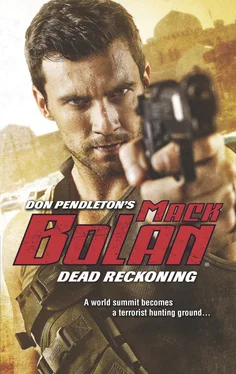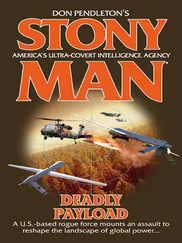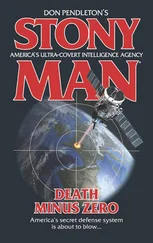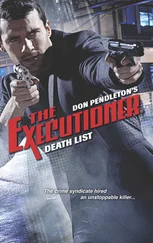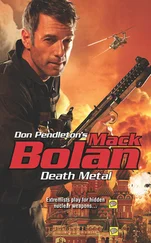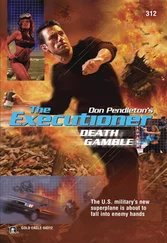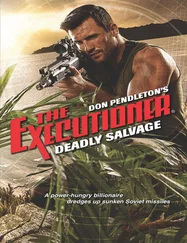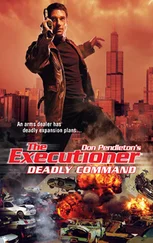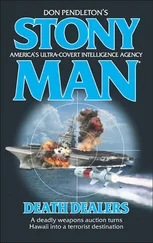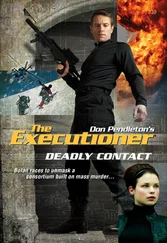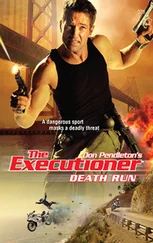One less thing for them to tell the police when they finally arrived.
And the police could turn up any moment, Rajhid realized. Then there could be gunfire, explosions, smoke and flames, for all he knew. The residents of Ciudad del Este were well acquainted with crime, but not with pitched battles fought in their midst.
Putting distance between himself and the scene, Rajhid spared a thought for whoever had raided the complex. Unlike Farsoun, he’d seen none of the raiders, therefore had no clue if they were locals or some kind of special unit from outside. The charm of Paraguay, for freedom fighters on the run, lay in its curious interpretation of what constituted terrorism. Any opposition to the ruling party was suppressed, but what a man did elsewhere—most particularly if his actions were directed against Jews and their supporters—might be overlooked, especially if cash changed hands.
But if the raid had been conducted by Crusaders, as Farsoun surmised, that would be something else.
Bin Laden had been slaughtered a US Navy SEAL team, at his lair in Pakistan, without a by-your-leave to the legitimate authorities. How many other heroes had been slain by rockets from a clear blue sky, triggered by hunters sitting in a bunker somewhere, half a world away?
Watching the traffic pass, alert for military or police vehicles, Rajhid wondered how the damned Crusaders could have found him here.
No matter.
For the moment, all he had to focus on was getting out alive.
* * *
THE ALLEY STANK, but that was par for any urban landscape in the tropics, where the seasons ranged from hot and damp to hot and soaking wet. The blacktop under Bolan’s feet was old, but still felt tacky from the heat, as if it had been freshly laid. He was halfway to the alley’s intersection with the street when Grimaldi dropped from the fire escape and started after him.
The runners he had glimpsed were gone, but they had turned left when they reached the street and Bolan went from there, tucking the AUG back underneath his raincoat, pausing long enough to let Grimaldi overtake him on the sidewalk.
“Farsoun was the one I recognized,” he said. “That makes the others Khamis and Rajhid. Two wearing white shirts, one in red, all three in khaki trousers.”
“Packing?” Grimaldi asked, while his eyes swept both sides of the street.
“Farsoun had something like an Ingram or a Micro Uzi. It was hard to tell. Assume they’re loaded.”
“There!” Grimaldi said, pointing as Bolan’s eyes locked on to a red shirt, retreating through the flow of window shoppers. Even as he spoke, the man in the red shirt glanced backward, seeming to meet Bolan’s gaze.
“Farsoun,” he said. “Let’s go.”
Before they’d covered half a block, he saw the other two, moving ahead of Farsoun on the same side of the street. Rajhid and Khamis wasted no time looking back, perhaps afraid of what was gaining on them, maybe just intent on getting clear and finding someplace new to hide. Whatever, Bolan had them spotted now, and he was bent on stopping them before they had a chance to disappear.
That thought had barely formed when one of them, wearing a white shirt, separated from the others, darting into traffic like a kamikaze bent on suicide, ducking and dodging as he ran to reach the far side of the street.
“I’m on him,” Grimaldi said, launching from the curb into a stream of steel and chrome, ignoring angry bleats from auto horns.
Instead of watching the pilot’s progress, Bolan pursued the targets dressed in red and white. They weren’t exactly running yet, but they were picking up the pace, anxious to clear the neighborhood before it swarmed with uniforms. Bolan had much the same idea himself, but couldn’t bail before he’d caught at least one of the fugitives.
Or done his best to catch them, anyway.
In a scene like this, he knew there was a chance he could lose both of them, or else be forced to take them down without a chance to ask the vital questions. Given that choice, Bolan would prefer dead terrorists to killers still at large and plotting their next move.
Ahead of him, the runners reached a cross street; one of them said something to the other, then they broke in opposite directions. One guy peeled away to Bolan’s left and out of sight around the corner, while his comrade bolted to the right, crossing against the light and nearly getting flattened by a taxi just before he reached the other curb.
There was no way to take the farthest runner down without endangering civilians and revealing he was armed. Bolan turned left and started running hard after the red shirt as its owner put on speed.
* * *
GRIMALDI WASN’T BIG, but he was fast. A mad dash through traffic with horns blaring at him, brakes screeching, had gotten his heart pumping. The shoulder-slung Spectre M4 slapped his ribs as he ran, until the Stony Man pilot clamped his right arm against it to stop the drumbeat. Every footfall sent a jolt along his spine and urged him to run faster.
Up ahead, his target—leaner, younger, desperate—had gained a lead on him and wasn’t slowing. The guy had glanced back once, treating Grimaldi to a glimpse of a familiar bearded face, then started running as if his life depended on it.
Which, in fact, it did.
Crossing the street in mid-block took them to another alley and more stinking garbage bins, rats the size of puppies scurrying where trash had overflowed or simply been discarded carelessly. The ground beneath their feet was asphalt, not concrete, almost spongy in the heat with soft rain pattering. Grimaldi knew that they were eastbound, headed for another street crowded with traffic and pedestrians, cars parked at crazy angles, people shopping under awnings that, for some reason he couldn’t grasp, were mostly blue.
It was the last place he would have chosen for a firefight.
If there was going to be gunplay—and Grimaldi didn’t doubt it for a second—he would rather keep it in the alley, where he didn’t have to fret about civilians wandering into the line of fire. The alley’s distant mouth was problematic, open to the street for any shots downrange that missed their mark, but it was better than a dose of Wild Bunch action on a teeming thoroughfare.
The runner had to have thought so, too, because he stopped abruptly, jerked some kind of stubby automatic weapon from his waistband, and cut loose at his pursuer from thirty yards. Grimaldi dodged behind a large garbage bin to his left, heard slugs plowing through blacktop and a few more rattling off the far end of the bin.
Whatever his intended mark was carrying, it had a rapid rate of fire—one of the MACs, perhaps, or one of the homegrown knock-offs. Whatever, it could slice and dice a man in nothing flat, the down side being that it burned through magazines like there was no tomorrow.
And if the Stony Man pilot’s intended target blew his load on random fire, there wouldn’t be.
At least, for him.
Grimaldi risked a peek around the bin, and his enemy unleashed another burst, cut short as he ran out of ammunition. Switching magazines took time—not much, but possibly enough—and Grimaldi broke toward the spot where he had seen his man duck out of sight, behind another rusty bin marked with gang graffiti.
It was going to be close, but if his luck held...
He was halfway to his destination when the wiry runner popped back into view, his weapon leveled from the hip. Grimaldi fired without a break in stride, a short burst meant to wound, but that was tricky from a stationary post, much less while sprinting. He saw bullets strike the target’s shirt, crimson erupting through the white fabric, and then his guy was going down, wasting his fresh mag on a slash of open sky above the alley.
Читать дальше
